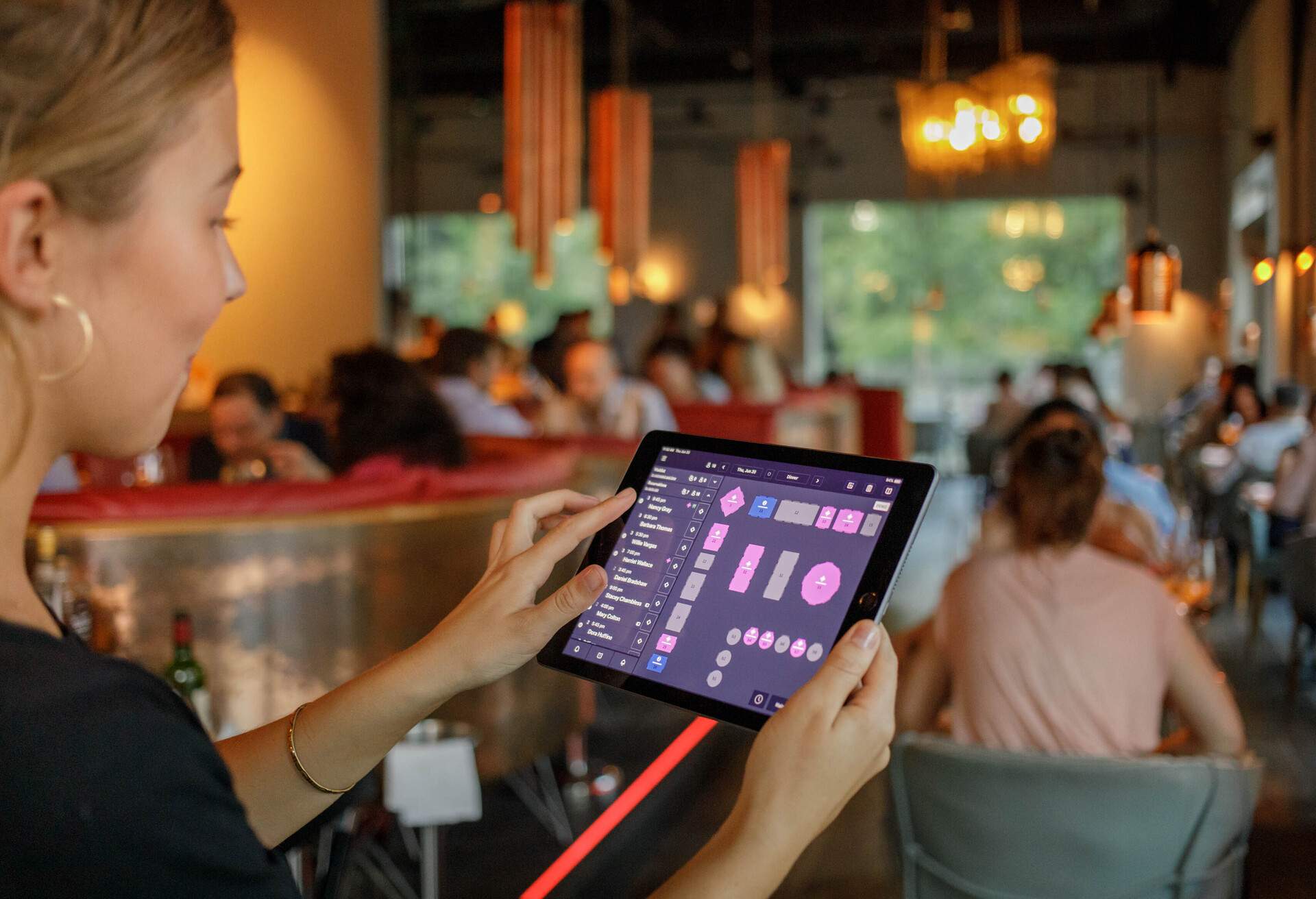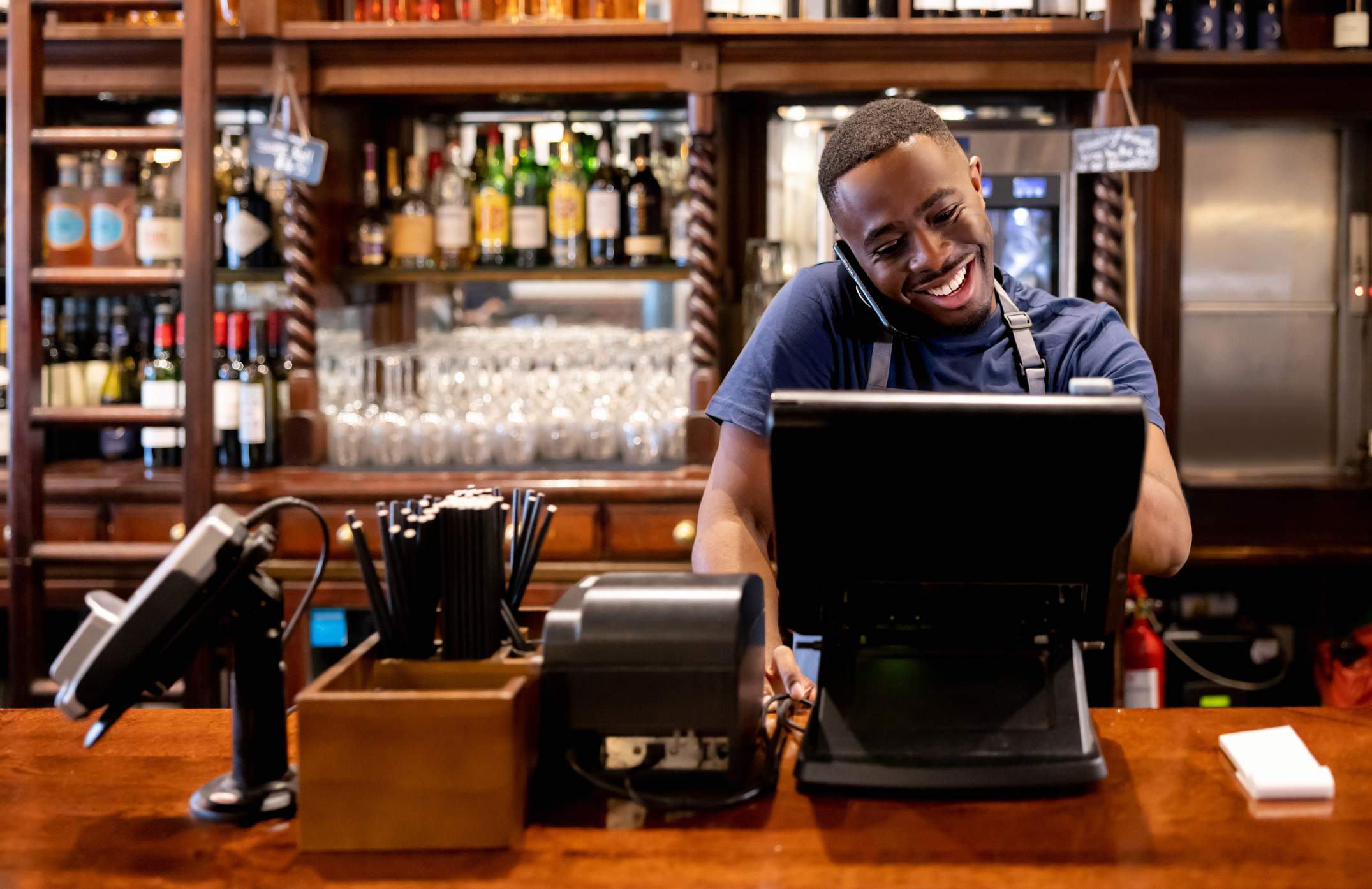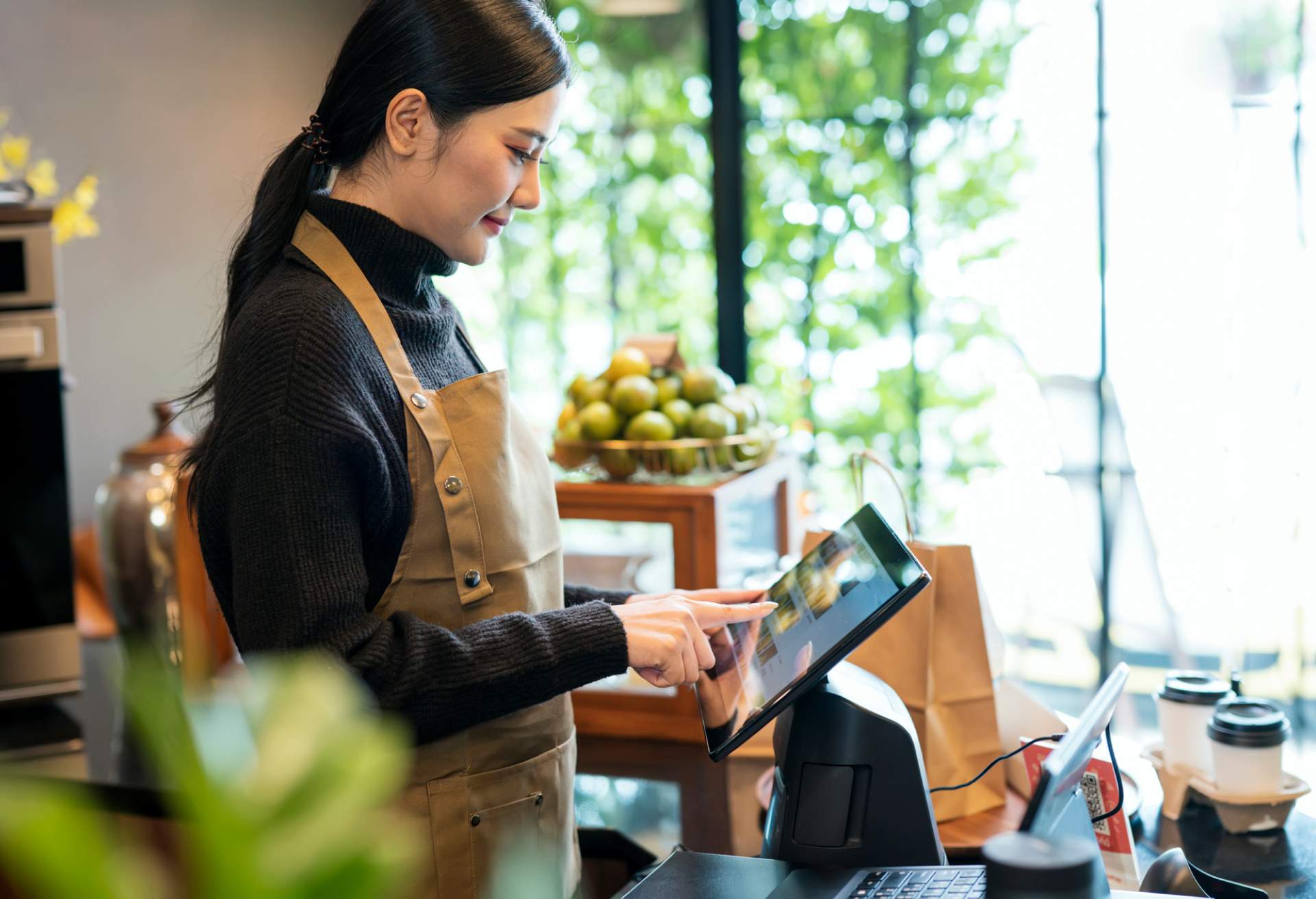Improved technology now means that restaurants have more point-of-sale (POS) options than ever, and choosing the right system is central to setting yourself up for success from day one.
Top-rated POS systems facilitate everything from integrating reservations and orders to tracking inventory and analysing customer data in real time. Here, we outline the key features to look for in a POS, followed by the leading systems making waves, from the best systems for small independents to enterprise-level solutions suited for high-end hospitality groups.
What makes a good POS system?
A quality POS system forms the operational backbone of any hospitality business. Key features to look for include:
- Seamless integration with your reservation platform, allowing you to match orders and spend history to individual guests.
- Intuitive, tablet-based interfaces minimise training time for staff and make taking orders easy, even during the busiest services.
- Reliable reporting provides real-time sales, inventory and staffing analytics to inform smarter decisions on the fly.
- An open API allows adding modules like online ordering or queue management as needed.
Ideally, the POS should grow with you, working as efficiently for a single site spot as for a 50-location restaurant group. The best systems facilitate granular insights that maximise covers and return visits.

The top 5 POS systems for restaurants right now
What are the best POS systems currently making headlines? We’ve put together a selection that caters to all different types of restaurants.
1) Toast
Toast leads the market with its all-in-one restaurant management system tailored for growth-focused operators. Featuring an intuitive design optimised for the iPad, Toast focuses on serving up actionable insights alongside a solid feature set — all on an affordable software-as-a-service (SaaS) model.
Budget
Toast comes with no upfront costs for hardware or software licensing. Users get a discounted monthly rate starting from £80 after an initial free demo period, with more in-depth versions available from £150 per month. There’s also a custom model designed for restaurants with specific needs.
Best for …
The Toast ecosystem is designed for restaurants and restaurants only. Its concept is a cloud-based system that helps uncover revenue opportunities without the need for a big IT budget. Especially strong inventory and ordering management make Toast a top contender for food-focused outlets. Killer reporting and analytics functionality empower managers to make data-driven decisions in real-time.
How does Toast integrate with OpenTable?
Toast integrates with OpenTable to provide restaurants with deeper guest insights, better hospitality and improved operational efficiency. Restaurants get more transparency from current and past visits, identification of high spenders and frequent visitors, plus the ability to recognise and retain them. The two platforms work together to help restaurants run elite operations and build deeper guest intelligence.
Key features
- Fully integrated point of sale, payments and reporting
- Robust menu, inventory and ordering management
- Customisable floor plans and tableside ordering
- Staff tracking and scheduling optimisation
- Real-time analytics and business insights
- API for integrating third-party applications
With an intuitive, lightweight platform plus pricing structured for growth, Toast leads the industry in serving up actionable insights to take the guesswork out of running a restaurant.
2) Lightspeed
Lightspeed offers a feature-rich yet user-friendly POS system built to meet the unique needs of restaurants. From independent eateries to national chains, its scalable platform gives food service owners insights to boost efficiency and profits.
Budget
Lightspeed makes enterprise-level technology accessible for establishments of all sizes with transparent and affordable monthly pricing. Plans start around £59 per month for the basic package and scale up based on your business needs — additional fees apply for payment processing.
Best for …
Whether you operate a single café or a multi-location group, Lightspeed equips you with capabilities like customisable menus, floor plans and reports. Robust integration with payments, inventory, payroll and more provides a unified view of your data to optimise decision-making.
How does Lightspeed integrate with OpenTable?
The Lightspeed-OpenTable integration connects online reservations with the POS for insights into diner spend and automatic table management. By linking guest profiles across platforms, restaurants gain visibility into their purchase history and real-time order data that helps staff personalise hospitality and turn tables faster.
Key capabilities
- Tailored POS configurations and settings per restaurant or franchise
- Granular analytics and forecasting across all locations
- Streamlined inventory, vendor and ordering management
- Seamless integration with payroll, accounting, ecommerce and food delivery partners
- Future-proof platform with constant development of new features
By consolidating vital systems and providing unparalleled visibility into metrics that impact the guest experience, Lightspeed gives restaurants an edge in driving traffic, increasing loyalty and boosting the bottom line.

3) Square
Founded by Twitter Founder Jack Dorsey, Square burst onto the scene by revolutionising mobile payment for small businesses. Today, its restaurant POS system delivers enterprise-grade capabilities tailored to the needs of ambitious spots worldwide. Square for Restaurants optimises operations in-house while expanding revenue channels through integrated on-demand delivery and order ahead.
Budget
Square POS follows a simple software-as-a-service model with no hidden fees. After an initial free trial, plans start from £69 per month and include advanced features such as course management, live sales reporting and 24/7 support. There’s also a custom pricing feature available for businesses that process more than £200,000 in annual sales.
Best for …
The Square ecosystem provides a scalable growth platform for quick-service restaurants, cafes, food trucks and other operators with a lean staff set-up. Key integrations streamline processes for businesses focused on improving a small footprint rather than large franchise management capabilities.
How does Square integrate with OpenTable?
The Square integration with OpenTable gives restaurants real-time visibility into reservations and table status directly within the Square dashboard. By centralising floor plans, guest details and order data, staff can optimise decisions to turn tables faster, manage waitlists smarter and make the most of per-guest revenue through a personalised guest experience.
Key features
- Intuitive iPad POS with offline mode support
- Integrated payments, invoices and deposit management
- Menu builder and cost tracking
- Real-time sales reporting and analytics
- Staff payroll and timecard management
- Optional online store builder, on-demand delivery, and order-ahead functionality
Square enables single and multi-location restaurants to punch above their weight with tools similar to major chains without the enterprise price tag. Its POS system forms the foundation for holistic growth online and offline.
4) Dojo
Dojo challenges legacy players with an integrated POS designed to amplify revenue opportunities for hospitality brands. Another tablet-based software, Dojo aims to centralise reservations, table management and payments all under one roof.
Budget
Dojo follows a monthly subscription model with customised quotes based on each restaurant’s size and order volume. All pricing is transparent upfront, including payment processing around 1.4% + 20p per transaction for turnovers of £150k or less.
Best for …
Dojo suits fast-casual chains along with bars, cafes and other volume-driven establishments doing quick table turnovers. Its specialised queue management and consumer-facing modules lend themselves particularly well to pre-theatre dining and event venues with waitlists.
How does Dojo integrate with OpenTable?
Currently, OpenTable doesn’t integrate with Dojo. However, it’s an impressive platform that should feature in the best five POS systems. While OpenTable doesn’t currently integrate with Dojo, that could change in the future. We’re always looking for ways to improve the overall experience and work with the best of the hospitality industry.
Key features
- Mobile POS, table and queue management
- Integrated payments with transparent rates
- Consumer app allowing self check-in and reservations
- Automated table status tracking and location mapping
- Custom packages for loyalty programs and meal tickets
- Fully branded modules and dashboard
For operators focused on getting the most out of per-seat revenue during peak times, Dojo delivers a customisable platform integrating vital systems to capture every potential pound.
5) Oracle Micros
Oracle Micros offers time-tested legacy POS systems tailored to the needs of high-volume hospitality enterprises. Its on-premise server infrastructure facilitates complex deployments with ironclad security, while the cloud-based Micros Simphony platform provides a more modern alternative.
Budget
As an enterprise-level solution, Oracle Micros requires a substantial upfront investment for a multi-site licence. Ongoing costs for maintenance, payment processing and other subscriptions also apply. However, for restaurants already relying on Oracle business solutions, bundling a POS system can provide deeper integration at reduced rates.
Best for …
With 30-plus years of perfecting deployments across the globe’s largest restaurant and hotel groups, resorts, casinos and event venues, Oracle Micros excels at large-scale chains. Its POS seamlessly handles the most complex menu, pricing and reporting needs of international luxury hospitality companies with extremely high transaction volumes.
How does Oracle Micros integrate with OpenTable?
With the Oracle Micros-OpenTable integration, you can automatically transfer reservation details to the POS system to eliminate duplicative data entry. Restaurants gain insights from combined guest spending and booking data to enhance table management, refine marketing, and enable staff to personalise hospitality through full order history visibility.
Key features
- Flexible POS configurations across stationary and mobile devices
- Granular menu and pricing management with automatic updates
- In-depth reporting and analytics on all facets of operations
- Inventory, supply chain and recipe costing functionality
- Configurations supporting global deployment
- End-to-end security protecting critical data
Oracle Micros caters to all types of restaurants, but for enterprise chains with extensive reporting and pricing complexity operating across many brands, properties and borders, Oracle Micros remains the gold standard in POS capabilities worldwide.
Summary: The best POS systems for restaurants
A quality POS empowers restaurants to turn tables faster, drive repeat visits and maximise per-guest revenue. Systems like Toast, Lightspeed and Square integrate reservations and payments for actionable insights to give guests the best possible experience. The right POS provides an affordable foundation to improve operations today and scale profitably tomorrow.




